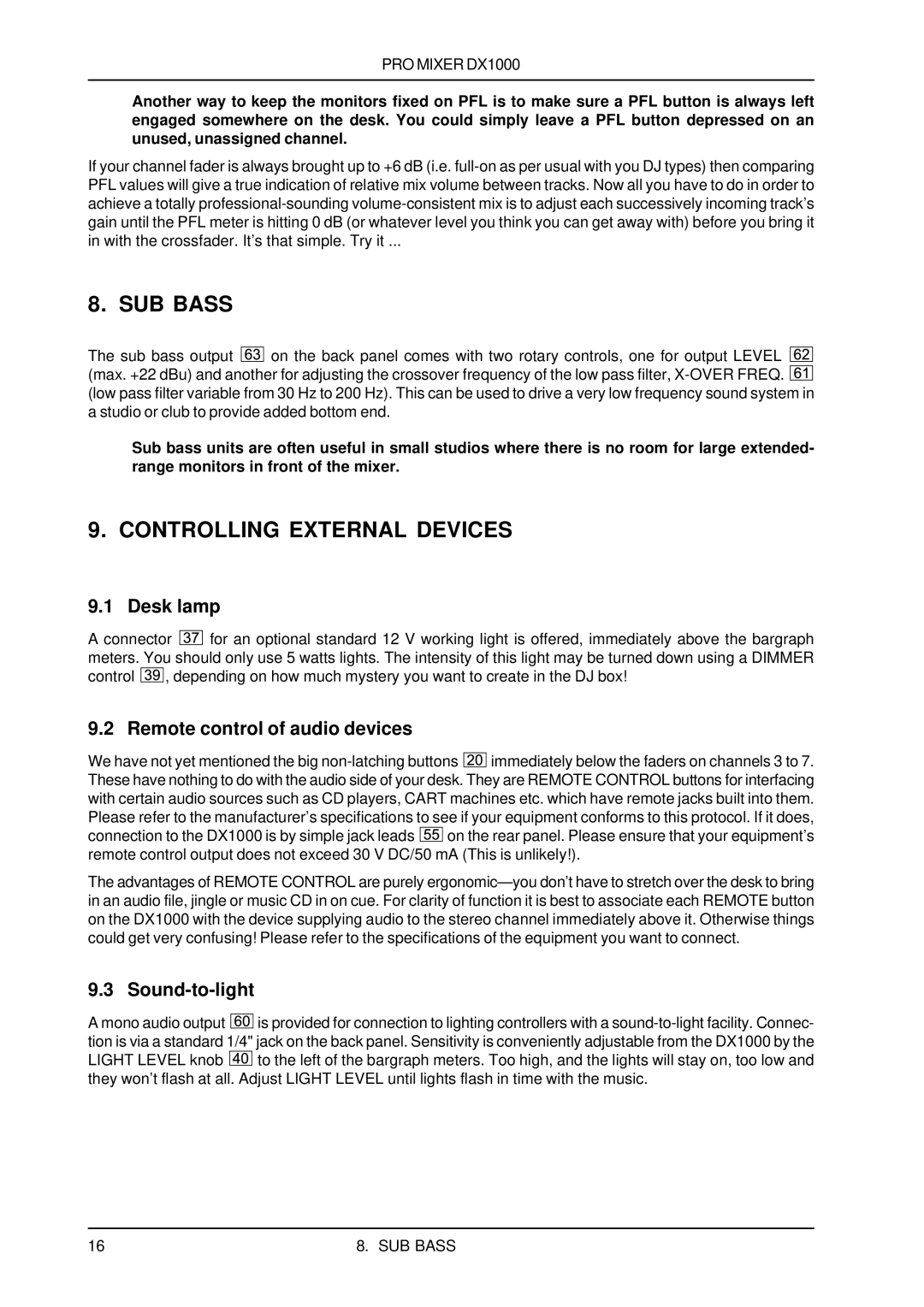
PRO MIXER DX1000
+Another way to keep the monitors fixed on PFL is to make sure a PFL button is always left engaged somewhere on the desk. You could simply leave a PFL button depressed on an unused, unassigned channel.
If your channel fader is always brought up to +6 dB (i.e.
8. SUB BASS
The sub bass output ![]()
![]()
![]() on the back panel comes with two rotary controls, one for output LEVEL
on the back panel comes with two rotary controls, one for output LEVEL ![]()
![]()
![]() (max. +22 dBu) and another for adjusting the crossover frequency of the low pass filter,
(max. +22 dBu) and another for adjusting the crossover frequency of the low pass filter, ![]()
![]()
![]() (low pass filter variable from 30 Hz to 200 Hz). This can be used to drive a very low frequency sound system in a studio or club to provide added bottom end.
(low pass filter variable from 30 Hz to 200 Hz). This can be used to drive a very low frequency sound system in a studio or club to provide added bottom end.
+Sub bass units are often useful in small studios where there is no room for large extended- range monitors in front of the mixer.
9. CONTROLLING EXTERNAL DEVICES
9.1 Desk lamp
A connector ![]()
![]()
![]() for an optional standard 12 V working light is offered, immediately above the bargraph meters. You should only use 5 watts lights. The intensity of this light may be turned down using a DIMMER control
for an optional standard 12 V working light is offered, immediately above the bargraph meters. You should only use 5 watts lights. The intensity of this light may be turned down using a DIMMER control ![]()
![]()
![]() , depending on how much mystery you want to create in the DJ box!
, depending on how much mystery you want to create in the DJ box!
9.2 Remote control of audio devices
We have not yet mentioned the big ![]()
![]()
![]() immediately below the faders on channels 3 to 7. These have nothing to do with the audio side of your desk. They are REMOTE CONTROL buttons for interfacing with certain audio sources such as CD players, CART machines etc. which have remote jacks built into them. Please refer to the manufacturer’s specifications to see if your equipment conforms to this protocol. If it does,
immediately below the faders on channels 3 to 7. These have nothing to do with the audio side of your desk. They are REMOTE CONTROL buttons for interfacing with certain audio sources such as CD players, CART machines etc. which have remote jacks built into them. Please refer to the manufacturer’s specifications to see if your equipment conforms to this protocol. If it does,
connection to the DX1000 is by simple jack leads ![]()
![]()
![]() on the rear panel. Please ensure that your equipment’s remote control output does not exceed 30 V DC/50 mA (This is unlikely!).
on the rear panel. Please ensure that your equipment’s remote control output does not exceed 30 V DC/50 mA (This is unlikely!).
The advantages of REMOTE CONTROL are purely
9.3 Sound-to-light
A mono audio output ![]()
![]()
![]() is provided for connection to lighting controllers with a
is provided for connection to lighting controllers with a
LIGHT LEVEL knob ![]()
![]()
![]() to the left of the bargraph meters. Too high, and the lights will stay on, too low and they won’t flash at all. Adjust LIGHT LEVEL until lights flash in time with the music.
to the left of the bargraph meters. Too high, and the lights will stay on, too low and they won’t flash at all. Adjust LIGHT LEVEL until lights flash in time with the music.
16 | 8. SUB BASS |
